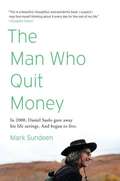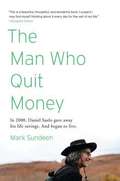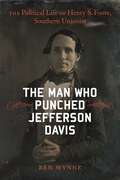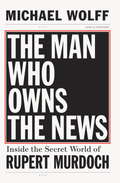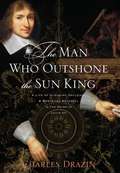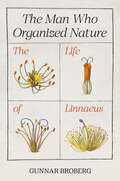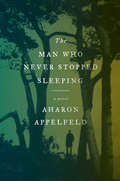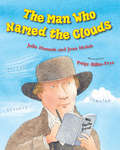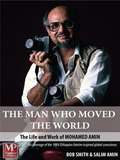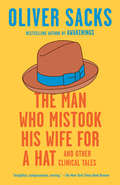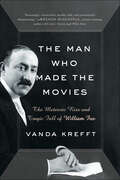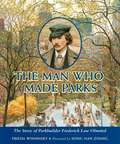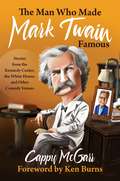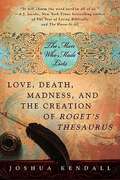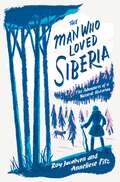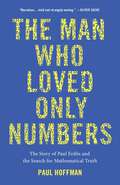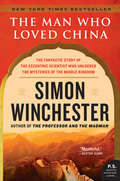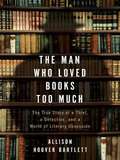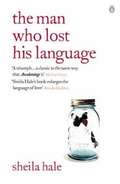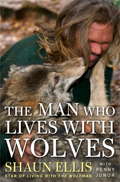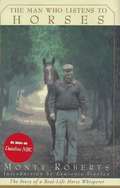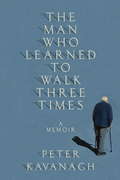- Table View
- List View
The Man Who Quit Money
by Mark SundeenA Walden for the 21st century, the true story of a man who has radically reinvented "the good life" In 2000, Daniel Suelo left his life savings; all thirty dollars of it; in a phone booth. He has been living without money; and with a newfound sense of freedom and security; ever since. The Man Who Quit Money is an account of how one man learned to live, sanely and happily, without earning, receiving, or spending a single cent. Suelo doesn't pay taxes, or accept food stamps or welfare. He lives in caves in the Utah canyonlands, forages wild foods and gourmet discards. He no longer even carries an I. D. Yet he manages to amply fulfill not only the basic human needs-for shelter, food, and warmth-but, to an enviable degree, the universal desires for companionship, purpose, and spiritual engagement. In retracing the surprising path and guiding philosophy that led Suelo into this way of life, Sundeen raises provocative and riveting questions about our relationships with money and the decisions we all make, by default or by design; about how we live and how we might live better.
The Man Who Quit Money
by Mark SundeenIn 2000, Daniel Suelo left his life savings-all thirty dollars of it-in a phone booth. He has lived without money-and with a newfound sense of freedom and security-ever since. The Man Who Quit Money is an account of how one man learned to live, sanely and happily, without earning, receiving, or spending a single cent. Suelo doesn't pay taxes, or accept food stamps or welfare. He lives in caves in the Utah canyonlands, forages wild foods and gourmet discards. He no longer even carries an I. D. Yet he manages to amply fulfill not only the basic human needs-for shelter, food, and warmth-but, to an enviable degree, the universal desires for companionship, purpose, and spiritual engagement. In retracing the surprising path and guiding philosophy that led Suelo into this way of life, Sundeen raises provocative and riveting questions about the decisions we all make, by default or by design, about how we live-and how we might live better.
The Man Who Punched Jefferson Davis: The Political Life of Henry S. Foote, Southern Unionist (Southern Biography Series)
by Ben WynneRegarded as one of the most vocal, well-traveled, and controversial statesmen of the nineteenth century, antebellum politician Henry Stuart Foote played a central role in a vast array of pivotal events. Despite Foote’s unique mark on history, until now no comprehensive biography existed. Ben Wynne fills this gap in his examination of the life of this gifted and volatile public figure in The Man Who Punched Jefferson Davis: The Political Life of Henry S. Foote, Southern Unionist.An eyewitness to many of the historical events of his lifetime, Foote, an opinionated native Virginian, helped to raise money for the Texas Revolution, provided political counsel for the Lone Star Republic’s leadership before annexation, and published a 400-page history of the region. In 1847, Mississippi elected him to the Senate, where he promoted cooperation with the North during the Compromise of 1850. One of the South’s most outspoken Unionists, he infuriated many of his southern colleagues with his explosive temperament and unorthodox ideas that quickly established him as a political outsider. His temper sometimes led to physical altercations, including at least five duels, pulling a gun on fellow senator Thomas Hart Benton during a legislative session, and engaging in run-ins with other politicians—notably a fistfight with his worst political enemy, Jefferson Davis. He left the Senate in 1851 to run for governor of Mississippi on a pro-Union platform and defeated Davis by a small margin. Several years later, Foote moved to Nashville, was elected to the Confederate Congress after Tennessee seceded, and continued his political sparring with the Confederate president.From Foote’s failed attempt to broker an unauthorized peace agreement with the Lincoln government and his exile to Europe to the publication of his personal memoir and his appointment as director of the United States mint in New Orleans, Wynne constructs an entertaining and nuanced portrait of a singular man who constantly challenged the conventions of southern and national politics.
The Man Who Owns the News: Inside the Secret World of Rupert Murdoch
by Michael WolffMurdoch's News Corp holdings - from The New York Post, Fox News, The Australian, and most recently The Wall Street Journal, to name just a few - are vast , and his power is unrivalled. So what makes a man like this tick? Michael Wolff gives us the definitive answer in THE MAN WHO OWNS THE NEWS. With unprecedented access to Murdoch himself, his associates, and family, Wolff chronicles the astonishing growth of the $70 billion media kingdom. In intimate detail he probes the Murdoch family dynasty, from the battles that have threatened to destroy it to the reconciliations that seem to only make it stronger. Drawing upon hundreds of hours of interviews, he offers accounts of the Dow Jones takeover as well as plays for Yahoo! and Newsday as they've never been revealed before. But Murdoch is more than a predatory and merciless deal-maker. His company does not only generate dizzying profits and growth rates. His company generates the information that forms our understanding of the world. He presides over what we read, what we watch, what we come to believe about ourselves, to an extent that is without serious parallel anywhere on earth. In the words of Michael Wolff, Murdoch 'held more power over more time than any other contemporary figure'. This is an opportunity to see and hear one of the most vivid, powerful, unusual, menacing and captivating men of the age. One of the central figures of our times. Written in the irresistible style that only an award-winning columnist for 'Vanity Fair' can deliver, THE MAN WHO OWNS THE NEWS offers an exclusive glimpse into a man who wields extraordinary power and influence in the media on a worldwide scale - and whose family is being groomed to carry his legacy into the future.
The Man Who Outshone the Sun King: A Life of Gleaming Opulence and Wretched Reversal in the Reign of Louis XIV
by Charles DrazinA richly textured biography of seventeenth-century minister Nicolas Fouquet, whose cunning and charisma brought him vast wealth and wide-ranging fame and, eventually, his own destruction
The Man Who Organized Nature: The Life of Linnaeus
by Professor Gunnar BrobergA new biography of Carl Linnaeus, offering a vivid portrait of Linnaeus’s life and workCarl Linnaeus (1707–1778), known as the father of modern biological taxonomy, formalized and popularized the system of binomial nomenclature used to classify plants and animals. Linnaeus himself classified thousands of species; the simple and immediately recognizable abbreviation “L” is used to mark classifications originally made by Linnaeus. This biography, by the leading authority on Linnaeus, offers a vivid portrait of Linnaeus’s life and work. Drawing on a wide range of previously unpublished sources—including diaries and personal correspondence—as well as new research, it presents revealing and original accounts of his family life, the political context in which he pursued his work, and his eccentric views on sexuality.The Man Who Organized Nature describes Linnaeus’s childhood in a landscape of striking natural beauty and how this influenced his later work. Linnaeus’s Lutheran pastor father, knowledgeable about plants and an enthusiastic gardener, helped foster an early interest in botany. The book examines the political connections that helped Linnaeus secure patronage for his work, and untangles his ideas about sexuality. These were not, as often assumed, an attempt to naturalize gender categories but more likely reflected the laissez-faire attitudes of the era. Linnaeus, like many other brilliant scientists, could be moody and egotistical; the book describes his human failings as well as his medical and scientific achievements. Written in an engaging and accessible style, The Man Who Organized Nature—one of the only biographies of Linnaeus to appear in English—provides new and fascinating insights into the life of one of history’s most consequential and enigmatic scientists.
The Man Who Never Stopped Sleeping: A Novel
by Aharon AppelfeldFrom the award-winning, internationally acclaimed author (“One of the greatest writers of the age”—The Guardian): a young Holocaust survivor takes his first steps toward creating a new life in the newly established state of Israel. Erwin doesn’t remember much about his journey across Europe when the war finally ended because he spent most of it asleep, carried by other survivors as they emerged from their hiding places or were liberated from the camps and made their way to the shores of Naples,where they filled refugee camps and wondered what was to become of them. As he struggles to stay awake, Erwin becomes part of a group of boys being rigorously trained both physically and mentally by an emissary from Palestine for life in their new home. The fog of sleep slowly begins to lift, and when Erwin and his fellow clandestine immigrants are released by British authorities from the detention camp in Atlit, he and his comrades are assigned to a kibbutz, where they learn how to tend to the land and speak their new language. But a part of Erwin desperately clings to the past—to memories of his parents, to his mother tongue, to the Ukrainian city where he was born—and he knows that despite what he is being told, who he was is just as important as who he is now becoming.When he is wounded in an engagement with snipers, Erwin must spend long months recovering from multiple surgeries and trying to regain the use of his legs. As he exercises his body, he exercises his mind as well, copying passages from the Bible in his newly acquired Hebrew and working up the courage to create his own texts in this language both old and new, hoping to succeed as a writer where his beloved, tormented father had failed. With the support of his friends and of other survivors, and with the encouragement of his mother (who visits him in his dreams), Erwin takes his first tentative steps with his crutches—and with his pen. Once again, Aharon Appelfeld mines heartrending personal experience to create dazzling, masterly fiction with a universal resonance.From the Hardcover edition.
The Man Who Named the Clouds
by Joan Holub Paige Billin-Frye Julie HannaIn 1782, when Luke Howard was ten, he began keeping a weather journal to describe what he saw in the sky--he especially loved to watch the clouds. As an adult, Luke wanted to classify clouds, though many others had failed at this.
The Man Who Moved the World: The Life and Work of Mohamed Amin
by Bob Smith Salim Amin Michael BuerkMohamed Amin was the most famous photo journalist in the world, making the news as often as he covered it. His coverage of the 1984 Ethiopian famine proved so compelling that it inspired a collective global conscience and became the catalyst for the greatest-ever act of giving--the "We Are the World" campaign. Unquestionably, it also saved the lives of millions of men, women and children. In a career spanning more than 30 years, Mo covered every major event in Africa and beyond, braving torture, surviving bombs and bullets to emerge as the most decorated news cameraman of all time. But his frenetic life was cut tragically short when, in November, 1996, hijackers took over an Ethiopian airliner forcing it to ditch in the Indian Ocean killing 123 passengers and crew. Mo died on his feet still negotiating with the terrorists.
The Man Who Mistook His Wife for a Hat: And Other Clinical Tales
by Oliver SacksIn his most beloved and extraordinary book, Dr. Sacks recounts the case histories of patients inhabiting the compelling world of neurological disorders. Featuring a preface never before included.Oliver Sacks's The Man Who Mistook His Wife for a Hat tells the stories of individuals afflicted with perceptual and intellectual disorders: patients who have lost their memories and with them the greater part of their pasts; who are no longer able to recognize people and common objects; whose limbs seem alien to them; who lack some skills yet are gifted with uncanny artistic or mathematical talents. In Dr. Sacks's splendid and sympathetic telling, his patients are deeply human, and his tales are studies of struggles against incredible adversity. A great healer, Sacks never loses sight of medicine's ultimate responsibility: "the suffering, afflicted, fighting human subject."
The Man Who Mistook His Wife for a Hat: And Other Clinical Tales
by Oliver SacksIn his most extraordinary book, the bestselling author of Awakenings and "poet laureate of medicine&” (The New York Times) recounts the case histories of patients inhabiting the compelling world of neurological disorders, from those who are no longer able to recognize common objects to those who gain extraordinary new skills.Featuring a new preface, Oliver Sacks&’s The Man Who Mistook His Wife for a Hat tells the stories of individuals afflicted with perceptual and intellectual disorders: patients who have lost their memories and with them the greater part of their pasts; who are no longer able to recognize people and common objects; whose limbs seem alien to them; who lack some skills yet are gifted with uncanny artistic or mathematical talents. In Dr. Sacks&’s splendid and sympathetic telling, his patients are deeply human and his tales are studies of struggles against incredible adversity. A great healer, Sacks never loses sight of medicine&’s ultimate responsibility: &“the suffering, afflicted, fighting human subject.&”
The Man Who Made the Movies: The Meteoric Rise and Tragic Fall of William Fox
by Vanda KrefftA riveting story of ambition, greed, and genius unfolding at the dawn of modern America. This landmark biography brings into focus a fascinating brilliant entrepreneur—like Steve Jobs or Walt Disney, a true American visionary—who risked everything to realize his bold dream of a Hollywood empire.Although a major Hollywood studio still bears William Fox’s name, the man himself has mostly been forgotten by history, even written off as a failure. Now, in this fascinating biography, Vanda Krefft corrects the record, explaining why Fox’s legacy is central to the history of Hollywood.At the heart of William Fox’s life was the myth of the American Dream. His story intertwines the fate of the nineteenth-century immigrants who flooded into New York, the city’s vibrant and ruthless gilded age history, and the birth of America’s movie industry amid the dawn of the modern era. Drawing on a decade of original research, The Man Who Made the Movies offers a rich, compelling look at a complex man emblematic of his time, one of the most fascinating and formative eras in American history.Growing up in Lower East Side tenements, the eldest son of impoverished Hungarian immigrants, Fox began selling candy on the street. That entrepreneurial ambition eventually grew one small Brooklyn theater into a $300 million empire of deluxe studios and theaters that rivaled those of Adolph Zukor, Marcus Loew, and the Warner brothers, and launched stars such as Theda Bara. Amid the euphoric roaring twenties, the early movie moguls waged a fierce battle for control of their industry. A fearless risk-taker, Fox won and was hailed as a genius—until a confluence of circumstances, culminating with the 1929 stock market crash, led to his ruin.
The Man Who Made Parks: The Story Of Parkbuilder Frederick Law Olmsted
by Frieda Wishinsky Song Nan ZhangWhen the great cities of North America were being developed, there was little thought to creating “green spaces. ” Frederick Law Olmsted combined his childhood love for nature with the structured beauty of the great parks of London and Paris to turn a neglected, swampy area into one of the most acclaimed parks in North America: Central Park in New York City.
The Man Who Made Mark Twain Famous: Stories from the Kennedy Center, the White House, and Other Comedy Venues
by Cappy McGarrIn The Man Who Made Mark Twain Famous, Cappy McGarr shares how he became an Emmy-nominated co-creator/executive producer of the Kennedy Center Mark Twain Prize for American Humor, and got involved in national politics—all with charming southern style and a self-deprecating sense of humor.For decades, Cappy McGarr has been in the room where it happens. With The Man Who Made Mark Twain Famous, he&’d like to invite you into that room, complete with his color commentary on the other folks inside. For the first time in print, Cappy reveals how the Mark Twain Prize was conceived, how it changed venues and networks, and even how it almost wasn&’t renewed after a controversial first outing with Richard Pryor. From there, Cappy pulls back the curtain for a behind-the-scenes look at over two decades of the Mark Twain Prize, sharing his take on the Kennedy Center&’s tributes to Pryor, Jonathan Winters, Carl Reiner, Whoopi Goldberg, Bob Newhart, Lily Tomlin, Lorne Michaels, Steve Martin, Neil Simon, Billy Crystal, George Carlin, Bill Cosby, Tina Fey, Will Ferrell, Ellen DeGeneres, Carol Burnett, Jay Leno, Eddie Murphy, Bill Murray, David Letterman, Julia Louis-Dreyfus, and Dave Chappelle. Cappy also gives the inside scoop on several shows he produced from the East Room of the White House, including the Gershwin Prize for Popular Song. Plus, he tells tales from his involvement in national politics—including encounters with the likes of President Lyndon B. Johnson, Senate Majority Leader Tom Daschle, Governor Ann Richards, President George W. Bush, President Barack Obama, and many others. &“Reading Cappy&’s book is not unlike sitting down to dinner with him and listening to the stories he has picked up from decades of rubbing elbows with political leaders and comedians alike. There are historic set pieces. There are laughs and howls and chuckles and chortles.&” —Ken Burns Cappy is donating all of his proceeds from this book to the Kennedy Center Arts Education Programs.
The Man Who Made Lists
by Joshua KendallIn the tradition of The Professor and the Madman, a "brisk and vivid"( Los Angeles Times) account of an obsessive scholar. Polymath, eccentric, and synonym aficionado, Peter Mark Roget had a host of female admirers, was one of the first to test the effects of laughing gas, invented the slide rule, and narrowly escaped jail in Napoleon's France. But Roget is best known for making lists. After the tragic turmoil of his early life (both his mother and sister were institutionalized), Roget longed for order in his chaotic world. At the age of eight, he began his quest to put everything in its rightful place, one word at a time. This is the fascinating story of a driven man and a brilliant scholar-and the legacy he has left for generations.
The Man Who Loved Siberia
by Roy Jacobsen Anneliese PitzSiberia, to me, is a fairy-tale land.Fritz Dörries set out on his first trip to Eastern Siberia in 1877, when there were still blank spaces on maps of the world. Travelling alone or with his brothers, he climbed mountains, traversed great rivers, explored remote islands and crossed treacherous lakes of ice, always with one purpose: to augment man's knowledge of the natural world. Bears, tigers, vipers, bandits, stormy seas, frostbite, ice chasms fathoms deep - every danger was faced head on and overcome. And yet he remained defenceless against the charms of the landscape, and the animals, birds and butterflies he found there.Through his twenty-two years in Siberia, Dörries collected a wealth of essential material for scientific institutions, fundamental to our understanding of fauna and flora. This account of his adventures, set down for his daughters in his ninetieth year, and adapted for publication by Roy Jacobsen and Anneliese Pitz, is his second great legacy.Translated from the Norwegian by Seán Kinsella
The Man Who Loved Only Numbers: The Story of Paul Erdos and the Search for Mathematical Truth
by Paul Hoffman"A funny, marvelously readable portrait of one of the most brilliant and eccentric men in history." --The Seattle Times Paul Erdos was an amazing and prolific mathematician whose life as a world-wandering numerical nomad was legendary. He published almost 1500 scholarly papers before his death in 1996, and he probably thought more about math problems than anyone in history. Like a traveling salesman offering his thoughts as wares, Erdos would show up on the doorstep of one mathematician or another and announce, "My brain is open." After working through a problem, he'd move on to the next place, the next solution. Hoffman's book, like Sylvia Nasar's biography of John Nash, A Beautiful Mind, reveals a genius's life that transcended the merely quirky. But Erdos's brand of madness was joyful, unlike Nash's despairing schizophrenia. Erdos never tried to dilute his obsessive passion for numbers with ordinary emotional interactions, thus avoiding hurting the people around him, as Nash did. Oliver Sacks writes of Erdos: "A mathematical genius of the first order, Paul Erdos was totally obsessed with his subject--he thought and wrote mathematics for nineteen hours a day until the day he died. He traveled constantly, living out of a plastic bag, and had no interest in food, sex, companionship, art--all that is usually indispensable to a human life."The Man Who Loved Only Numbers is easy to love, despite his strangeness. It's hard not to have affection for someone who referred to children as "epsilons," from the Greek letter used to represent small quantities in mathematics; a man whose epitaph for himself read, "Finally I am becoming stupider no more"; and whose only really necessary tool to do his work was a quiet and open mind. Hoffman, who followed and spoke with Erdos over the last 10 years of his life, introduces us to an undeniably odd, yet pure and joyful, man who loved numbers more than he loved God--whom he referred to as SF, for Supreme Fascist. He was often misunderstood, and he certainly annoyed people sometimes, but Paul Erdos is no doubt missed. --Therese Littleton
The Man Who Loved China
by Simon WinchesterIn sumptuous and illuminating detail, Simon Winchester, the bestselling author of The Professor and the Madman ("Elegant and scrupulous"-New York Times Book Review) and Krakatoa ("A mesmerizing page-turner"-Time) brings to life the extraordinary story of Joseph Needham, the brilliant Cambridge scientist who unlocked the most closely held secrets of China, long the world's most technologically advanced country. No cloistered don, this tall, married Englishman was a freethinking intellectual, who practiced nudism and was devoted to a quirky brand of folk dancing. In 1937, while working as a biochemist at Cambridge University, he instantly fell in love with a visiting Chinese student, with whom he began a lifelong affair. He soon became fascinated with China, and his mistress swiftly persuaded the ever-enthusiastic Needham to travel to her home country, where he embarked on a series of extraordinary expeditions to the farthest frontiers of this ancient empire. He searched everywhere for evidence to bolster his conviction that the Chinese were responsible for hundreds of mankind's most familiar innovations-including printing, the compass, explosives, suspension bridges, even toilet paper-often centuries before the rest of the world. His thrilling and dangerous journeys, vividly recreated by Winchester, took him across war-torn China to far-flung outposts, consolidating his deep admiration for the Chinese people. After the war, Needham was determined to tell the world what he had discovered, and began writing his majestic Science and Civilisation in China, describing the country's long and astonishing history of invention and technology. By the time he died, he had produced, essentially single-handedly, seventeen immense volumes, marking him as the greatest one-man encyclopedist ever. Both epic and intimate, The Man Who Loved China tells the sweeping story of China through Needham's remarkable life. Here is an unforgettable tale of what makes men, nations, and, indeed, mankind itself great-related by one of the world's inimitable storytellers.
The Man Who Loved China
by Simon WinchesterIn sumptuous and illuminating detail, Simon Winchester, the bestselling author of The Professor and the Madman ("Elegant and scrupulous"--New York Times Book Review) and Krakatoa ("A mesmerizing page-turner"--Time) brings to life the extraordinary story of Joseph Needham, the brilliant Cambridge scientist who unlocked the most closely held secrets of China, long the world's most technologically advanced country.No cloistered don, this tall, married Englishman was a freethinking intellectual, who practiced nudism and was devoted to a quirky brand of folk dancing. In 1937, while working as a biochemist at Cambridge University, he instantly fell in love with a visiting Chinese student, with whom he began a lifelong affair.He soon became fascinated with China, and his mistress swiftly persuaded the ever-enthusiastic Needham to travel to her home country, where he embarked on a series of extraordinary expeditions to the farthest frontiers of this ancient empire. He searched everywhere for evidence to bolster his conviction that the Chinese were responsible for hundreds of mankind's most familiar innovations--including printing, the compass, explosives, suspension bridges, even toilet paper--often centuries before the rest of the world. His thrilling and dangerous journeys, vividly recreated by Winchester, took him across war-torn China to far-flung outposts, consolidating his deep admiration for the Chinese people.After the war, Needham was determined to tell the world what he had discovered, and began writing his majestic Science and Civilisation in China, describing the country's long and astonishing history of invention and technology. By the time he died, he had produced, essentially single-handedly, seventeen immense volumes, marking him as the greatest one-man encyclopedist ever.Both epic and intimate, The Man Who Loved China tells the sweeping story of China through Needham's remarkable life. Here is an unforgettable tale of what makes men, nations, and, indeed, mankind itself great--related by one of the world's inimitable storytellers.
The Man Who Loved Books Too Much
by Allison Hoover BartlettIn the tradition of The Orchid Thief, a compelling narrative set within the strange and genteel world of rare-book collecting: the true story of an infamous book thief, his victims, and the man determined to catch him.Rare-book theft is even more widespread than fine-art theft. Most thieves, of course, steal for profit. John Charles Gilkey steals purely for the love of books. In an attempt to understand him better, journalist Allison Hoover Bartlett plunged herself into the world of book lust and discovered just how dangerous it can be.John Gilkey is an obsessed, unrepentant book thief who has stolen hundreds of thousands of dollars worth of rare books from book fairs, stores, and libraries around the country. Ken Sanders is the self-appointed "bibliodick" (book dealer with a penchant for detective work) driven to catch him. Bartlett befriended both outlandish characters and found herself caught in the middle of efforts to recover hidden treasure. With a mixture of suspense, insight, and humor, she has woven this entertaining cat-and-mouse chase into a narrative that not only reveals exactly how Gilkey pulled off his dirtiest crimes, where he stashed the loot, and how Sanders ultimately caught him but also explores the romance of books, the lure to collect them, and the temptation to steal them. Immersing the reader in a rich, wide world of literary obsession, Bartlett looks at the history of book passion, collection, and theft through the ages, to examine the craving that makes some people willing to stop at nothing to possess the books they love.
The Man Who Loved Books Too Much
by Bartlett Allison HooverIn the tradition of The Orchid Thief, a compelling narrative set within the strange and genteel world of rare-book collecting: the true story of an infamous book thief, his victims, and the man determined to catch him. Rare-book theft is even more widespread than fine-art theft. Most thieves, of course, steal for profit. John Charles Gilkey steals purely for the love of books. In an attempt to understand him better, journalist Allison Hoover Bartlett plunged herself into the world of book lust and discovered just how dangerous it can be. Gilkey is an obsessed, unrepentant book thief who has stolen hundreds of thousands of dollars? worth of rare books from book fairs, stores, and libraries around the country. Ken Sanders is the self-appointed ?bibliodick? (book dealer with a penchant for detective work) driven to catch him. Bartlett befriended both outlandish characters and found herself caught in the middle of efforts to recover hidden treasure. With a mixture of suspense, insight, and humor, she has woven this entertaining cat-and-mouse chase into a narrative that not only reveals exactly how Gilkey pulled off his dirtiest crimes, where he stashed the loot, and how Sanders ultimately caught him but also explores the romance of books, the lure to collect them, and the temptation to steal them. Immersing the reader in a rich, wide world of literary obsession, Bartlett looks at the history of book passion, collection, and theft through the ages, to examine the craving that makes some people willing to stop at nothing to possess the books they love. .
The Man Who Lost His Language
by Sheila HaleSir John Hale is one of the worlds foremost renaissance historians whose book The Civilization of Europe in the Renaissance (1993) won The Royal Society of Literature's Heinemann Award and the International Silver Pen. Soon after delivering the second draft of his text, Hale had a stroke that deprived him of the power of speech. His wife Shelia Hale set out to find out what had happened and how John might be brought back to normal as far as possible. The book combines a detailed account of dysphasia and what he can tell us about language with a personal account of John and Shelia's own expericences.
The Man Who Lives with Wolves
by Shaun Ellis Penny JunorTo wolf expert, Shaun Ellis, wolves arenâ t just his work, theyâ re also his family. An extraordinary man, Shaun has been fascinated by wolves all his life, even living as part of a wild pack for two years with no human contact. What he gained was a unique and fascinating insight into their world, and that of our very own domestic dogs. Shaun Ellis grew up in the Norfolk countryside with a passion for and understanding with animals from an early age. His early fascination with wolves, and determination to understand them, led to him spending years in the US with the Naz Paz Indian tribe, watching wolves, learning to understand their roles and behaviour in the pack and how to communicate with them. He even lived as part of a wild pack for two years, without any human contact. Bringing his knowledge back to the UK, he astonished wildlife experts with his knowledge and insight. He now lives, eats and sleeps with his two wolf packs at Combe Martin Wildlife Park. This is the story of Shaunâ s determination to understand these extraordinary animals and how what he has learned can help others to understand their own domestic dogs.
The Man Who Listens to Horses
by Monty RobertsNot only does this book tell the story of Monty Roberts, but also it teaches horse-lovers a gentle way to work with their beloved animals.
The Man Who Learned to Walk Three Times
by Peter KavanaghFrom the well-known CBC journalist comes a story of hardship, resilience and repeatedly learning the same lesson. Peter Kavanagh was just an infant when he was diagnosed with paralytic polio and suffered permanent paralysis in the lower part of his left leg. As a child, Kavanagh endured painful medical procedures to even out the length of his legs, and experimental exercise techniques. He spent his youth in a leg brace and special footwear, isolating for a boy whose classmates ran freely in sneakers. His first lesson in walking was how to move while wearing such equipment. Throughout his life, as he developed a very successful career in public broadcasting, built a family, and indulged in his love of music and travel, Kavanagh underwent various surgeries and rehabilitation to give him "normal" mobility. The Man Who Learned to Walk Three Times is a moving memoir of a full life, and of learning the same lesson over and over. Like Oliver Sacks's books and Marni Jackson's classic Pain: The Fifth Vital Sign, it combines medical history with a very personal case study. It documents coping with one's pain, guilt and shame, and the anger that arises from being bullied. But this book is also a story of healing and rehabilitation, and of hard lessons, hard earned--about the courage to keep going and, if one way isn't working, the awareness and bravery to try something new. Over time, these decisions and lessons help form a sense of identity; as Kavanagh says, "Walking is the key to who I am."
